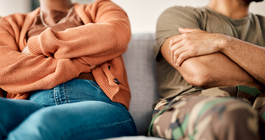
March 06, 2020
The first coronavirus case in the Philadelphia region was confirmed on Friday. But anxiety about the virus has been spreading for some time.
And for some people, that anxiety can be crippling.
"We get flooded with so much information so quickly," said Dr. Thea Gallagher, clinic director for Penn Medicine's Center for the Treatment and Study of Anxiety. "I think it can make people feel very overwhelmed and scared when there's a lot we don't know and we have to live with the uncertainty."
The center already had been seeing patients struggling with anxiety about the coronavirus before two presumptive cases were reported in Pennsylvania, including one in Delaware County. Psychologists strive to help such patients take a balanced approach – taking reasonable actions while recognizing life contains all kinds of uncertainty, Gallagher said.
People take risks every day without adding stress. Most Americans hop in their cars every morning despite there being 40,000 traffic deaths each year. And influenza, which has caused at least 20,000 deaths this flu season, doesn't prompt shortages of hand sanitizer.
But the human brain often ignores probabilities, Gallagher said. And that leaves people with anxiety about things beyond their control.
"There definitely is an exaggeration of risk at this point compared to what we know," Gallagher said Thursday. "We tolerate risk and we tolerate uncertainty in some areas, but because this feels new and out of control, people are just getting worked up by the uncertainty of it all."
That uncertainty can cause people to try to escape or over-control their environments.
Health officials stress that the best way to prevent coronavirus is to practice good hand hygiene, disinfect surfaces and to avoid people who are sick. Additionally, sick individuals should quarantine themselves to prevent passing the illness to others.
They urge people against wearing facial masks, which provide little protection to healthy Americans. And though the CDC has warned that more stringent measures could become necessary, health experts continue to stress that risk of infection remains low.
Having some anxiety over the coronavirus is a normal experience, according to Kelly Gilrain, director of behavioral medicine at Cooper University Health Care. It alerts people to potential harm.
In regard to the coronavirus, that anxiety may prompt people to wash their hands more often or become more mindful of people who cough near them. But when it causes significant behavioral changes, it can become problematic.
"For folks that are concerned about COVID-19 and aren't leaving their houses or doing things that are out of the norm for them, that's considered panic," Gilrain said.
To reduce that heightened anxiety, Gilrain suggested people practice grounding techniques. They should try to recognize that they're in a specific moment by citing the things they can see, feel, touch, taste and hear. And they can challenge their thoughts by asking a series of questions.
"Am I definitely getting coronavirus?" Gilrain said. "Is that true? Can you know? How do I react to that? What would (my life) look like without that thought?"
Gilrain also recommends people maintain their typical schedules and continue valued activities. If necessary, they can make alterations. Instead of going to the gym, where people work out in tight quarters, she suggested they try going for a walk.
Focusing on valued activities can help people keep the coronavirus in perspective, Gilrain said. It prevents panic. Mindfulness also can help.
"Anxiety has this funny way of spirling itself," Gilrain said. "It tends to escalate within itself. Then you start to worry about being worried. You start to anticipate that anxious feeling and it becomes this vicious cycle."
Additionally, being mindful of news intake also is important, the Gilrain and Gallagher said. Stick to reliable sources, like the U.S. Centers for Disease Control and Prevention or the World Health Organization, for information. And maybe a trustworthy news source.
But they advised against Googling symptoms and overindulging on the latest news coverage.
"If you need to understand what the reasonable protocols are, look at it once and move on with your life," Gallagher said.